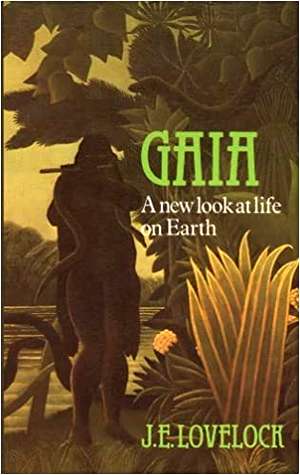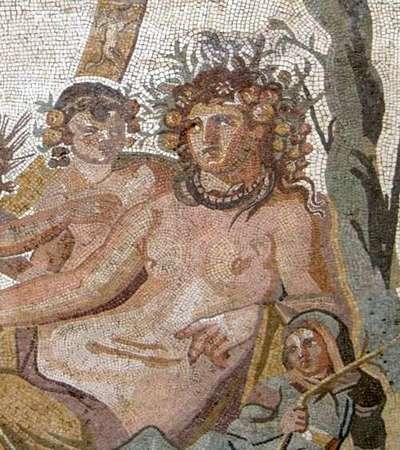
The Meaning of Gaia in Space Age Mythology
by Sylvia Engdahl
Most of this essay is part of the series "The New Mythology of the Space Age" at my website, which consists of the material for the course on Science Fiction and Space Age Mythology that I taught online through Connected Education in the early nineties. I have made some minor revisions.*
Until comparatively recently, the only notable expressions of Space Age mythology were pop-culture science fiction on one hand and UFO lore on the other. Now, however, an alternate view, popular among environmentalists as well as New Age devotees, is gaining ground. Its focus is the Gaia myth, which started out as a scientific hypothesis and has been merged with elements from pagan religions and other ancient mythologies. The hypothesis, though highly controversial, has a firm basis in science; but it is being extended in metaphorical ways and is proving to have great mythic power in our culture. Though some educated people take it more or less literally, I personally believe that the image of Planet Earth as a living--sometimes even conscious--being (as distinguished from the locale of interactions between living species) is a perfect example of a metaphor that emerges as a reflection of feelings about the universe.
We live in a society in which people's opinions are varied and often conflict--so in our culture, unlike earlier ones, it's possible to have authentic myths that not everyone agrees with in even a metaphorical sense. That is, though a myth may express the attitude of some people, there are going to be others who not only don't take it literally, but don't share the underlying outlook. Some people do react in this way to space fiction; they are not emotionally attracted to it. And I admit that this is how I myself feel about the emerging myth of our planet as an organism, one of which we're inextricably a dependent part.
 But the popular quasi-religious
movement that's developed around Gaia goes much further than that. Fanatic
environmentalists now often use its imagery to gather emotional support for policies
that ignore the very self-adjusting properties of Earth predicted by Gaian
theory. Furthermore, it has become identified with Mother Earth/goddess
worship, which is for the most part antagonistic to human progress and which
fosters the notion that we as a species are wholly dependent on an unchanging
Earth for our own life. The Commonwealth Institute of London, funded in part by
the British government, taught children to sing:
But the popular quasi-religious
movement that's developed around Gaia goes much further than that. Fanatic
environmentalists now often use its imagery to gather emotional support for policies
that ignore the very self-adjusting properties of Earth predicted by Gaian
theory. Furthermore, it has become identified with Mother Earth/goddess
worship, which is for the most part antagonistic to human progress and which
fosters the notion that we as a species are wholly dependent on an unchanging
Earth for our own life. The Commonwealth Institute of London, funded in part by
the British government, taught children to sing:
Gaia is the one who gives us birth
She's the air, she's the sea, she's Mother Earth.
She's the creatures that crawl and swim and fly
She's the growing grass, she's you and I.
Christian fundamentalists were understandably upset, but one does not need to take Judeo-Christian mythology literally to find this attitude toward our home planet damaging to human aspirations.
The belief that the earth is a living creature to be worshipped as a mother is an ancient one, fundamental to many mythologies. (In fact, some forms of esotericism claim "life" and even consciousness for inorganic celestial bodies as well, so that the Gaia hypothesis has been criticized for attributing it only to Earth and not to all planets and stars.) And, significantly, worship of the Earth Mother has in past cultures generally existed alongside the rival concept of sky-god worship, sometimes prevailing, in others, being superseded. Thus the blending of this traditional metaphor with modern science represents not a new concept, but a revival, one with deep roots in the human unconscious. In itself, the concept is positive, and some of its implications are constructive. Earth is indeed our "mother world" and of course, we should always preserve and honor it.

The earth goddess Terra, Roman equivalent of the Greek goddess Gaia. (Detail from a Roman mosaic ca. 200–250 C.E.)
However--and this is a point fanatic Gaians seem to miss--if the metaphor is going to be used, it should be carried to its logical culmination. Do adults depend on their mothers for continued life? Do we admire adults who want to live with Mother forever without striking out on their own? Why, then, should we believe that human beings are nothing apart from physical and spiritual oneness with Mother Earth?
The question arises as to why this new and inconsistent myth is so appealing, if, as I believe, it is maladaptive, not in the best interests of human survival. I think it's partly that people are afraid of change, and they don't want to admit that our immediate environment can't stay the same in an overpopulated world as it was in an underpopulated one. Furthermore, a deep fear of ecological peril now pervades our culture, which in itself is a response to Space Age awareness of the planet's limits--as is generally recognized--and, I believe, it's a mythic rather than rational fear, one that despite propaganda to the contrary, a good many scientists don't share.
But there's a deeper reason for the Gaia myth's appeal. Its adherents often cite the image of Earth in space as evidence that this is, as Campbell put it in his book Myths to Live By, "the one oasis in all space, an extraordinary kind of sacred grove, as it were, set apart for the rituals of life. . . . We have all now seen for ourselves how very small is our heaven-born earth, and how perilous our position on the surface of its whirling, luminously beautiful orb." Emotionally, this is a very powerful image. It tends to make people identify with Earth, all of it, not just in the sense of considering it a single world in the political sense, but in the sense of truly considering the whole planet to be sacred in the ancient mythological sense of that term.
In my opinion, this reaction is a sign of our culture's natural ambivalence about our perception of a universe larger than Earth. While people who enjoy space fiction respond positively to that perception, the Gaia devotees respond with apprehension--they shrink back from it, and allow the known environment to absorb their entire attention. Like Bettleheim's words quoted in my essay "The Mythic Role of Space Fiction," their view is comparable to Pascal's famous remark about the terrors of infinite space.

A typical modern personification of Earth as a goddess.
It is not a logical view. Certainly we love our home planet, and certainly it's beautiful--but to consider it "the one oasis in all space" on the basis of having explored no farther than the moon is utter nonsense. In the first place, there is no reason to suppose there isn't life elsewhere, and in the second place, even if there isn't, we will transport it elsewhere, not only ourselves, but whole ecologies. Lovelock himself admits this; in answer to the argument that Earth cannot be considered alive unless it can reproduce, he wrote a fictional account titled The Greening of Mars (co-authored with Michael Allaby). Gaians in general, however, ignore such considerations. I'm sure it would be impossible to convince them that if Earth is now in apparent poor health, it's because She is pregnant.
Pregnancy being a condition that provides its own "cure" in the course of time, I trust, as an optimist, that the Gaia myth--its popular interpretation, in any case--will ultimately fade away. Essentially it's based on fear, and on provincialism centered upon Earth itself rather than some particular region of Earth. It is the ultimate form of chauvinism. And this outlook toward the universe is the antithesis of that reflected in the rest of Space Age mythology
*
When I wrote this essay for the course I taught in 1995, I believed that the metaphor of a pregnant Gaia was an original thought on my part. I later found that although it occurred to me independently, it had also occurred to several other writers. Italian space activist Adriano Autino has published a book (unavailable in English) titled Earth Is Not Sick: She's Pregnant! David Buth has pointed out that the changes to a pregnant woman's body would be very frightening to someone who did not know what they meant, and that pregnancy and birth can indeed be very dangerous for a woman. "In the context of the Mother Earth metaphor, humanity's purpose is obvious," he writes. "We are here to help Mother Earth give birth. We are the reproductive organs."
Some space advocates now espouse the Gaia metaphor, saying that it is our role to enable Gaia's reproduction by spreading life throughout the universe. For example, Steven Wolfe, in his book The Obligation, maintains that we are morally obliged to colonize space not only to ensure our long-term survival but to replicate Gaia throughout the universe. I personally don't agree that we have any such ethical imperative because I believe life already exists elsewhere. I feel that starfaring species should take other lifeforms only where they're needed to make colonies habitable, and that where they're not, indigenous life--and lifeless worlds potentially useful for other purposes or by other starfarers with different biological needs--should be left alone. But I certainly don't object to this use of the Gaia image; I'm all for it if it can convince Gaia enthusiasts that space travel is a natural and important step in evolution.
The fact remains, however, that the
vast majority of people who worship Mother Earth do so as a retreat from facing
the wider universe, and that to the general public, Gaia imagery fosters such
an attitude. So I believe that on the whole the Gaia myth represents a false
view of our place in the universe that is potentially threatening to our future
survival.
Copyright 1995, 2017 by Sylvia Engdahl
All rights reserved.
This essay is included in my ebook The Future of Being Human and Other Essays